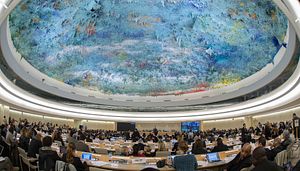U.S. diplomat Sheba Crocker has recently written an interesting piece about Washington’s leadership at the UN Human Rights Council. Let’s look more closely at the article and then briefly consider Obama’s record on human rights more broadly.
Here’s the start of Crocker’s piece:
When the Obama administration decided to reengage with the United Nations Human Rights Council in 2009, it did so with open eyes. Despite having only been established in 2006, the Council was already off to a disappointing start, unfairly targeting Israel and refusing to confront seriously human rights issues in other countries. Like they had at the widely discredited UN Human Rights Commission before it, regional groupings protected their own bad actors against scrutiny and action by the Human Rights Council, and put forward candidates for membership with questionable human rights practices, at best.
Here’s the next paragraph:
In the years since the United States joined, the Council has dramatically improved its track record in carrying out its fundamental mission of protecting and promoting human rights around the globe. While it remains an imperfect body — with many states with poor human rights records among its members and a persistent (though diminished) bias against Israel — the Council is now shining a light on the worst violations of human rights, including in places such as Syria, North Korea, Sudan, and Iran, and helping create space for civil society to hold governments to account. There is no doubt that U.S. leadership and diplomatic muscle have contributed to this dramatic change in orientation and performance…
Encouragingly, Washington has been elected to serve another three-year-term starting in January. There’s no question that Obama’s team deserves credit for recognizing that the Council is a venue that needs American leadership. However, pointing to clear-cut success stories can get complicated in a hurry. Crocker has devoted an entire paragraph to Sri Lanka in her piece.
We can also measure the success of the Human Rights Council by the real-world change that its actions support. Take Sri Lanka, for example. Before our arrival, the Council was on the wrong side of the conflict in Sri Lanka, passing a resolution that effectively congratulated the Sri Lankan government for actions that resulted in tens of thousands of civilian deaths. With U.S. and like-minded leadership, the Council adopted a more critical approach to events in Sri Lanka, aimed at addressing serious concerns and promoting accountability.When national elections in 2015 ushered in new political leadership in Sri Lanka, the UN was well positioned to help support an internationally sanctioned transitional justice process acceptable to the Sri Lankan people and the government.
Indeed, the U.S. did back annual country-specific resolutions on Sri Lanka from 2012-2014. It’s also true that elections in 2015 brought a new administration to power and, with it, a wide-ranging reform agenda The UN has shown support for a transitional justice process in Sri Lanka too. But here’s where things get complicated.
To begin, it’s hard to argue that Sri Lanka’s transitional justice process is “acceptable to the Sri Lankan people and the government,” as Crocker suggests. In October 2015, Colombo committed to a broad transitional justice process, yet most of those plans have yet to be implemented. What’s more, transitional justice is (understandably) a difficult, divisive issue. It’s not clear why Crocker believes that matters like a truth commission, accountability for wartime abuses, or even deeper devolution are now acceptable to “Sri Lankans” (it’s a diverse country) and the administration in Colombo. If that were clearly the case, Colombo would probably be doing a better job of explaining transitional justice to the public. Besides, the coalition government seems to have reneged on its commitments vis-à-vis international participation (particularly as it relates to accountability), something that would help ensure the process is credible. Essentially, a lot is still unknown and plenty remains to be done.
More generally, nailing down the Obama administration’s major human rights achievements is difficult to do. Washington’s engagement with the Council is a relative bright spot, although even those accomplishments are rather modest. In the coming months, we’ll likely know more about America’s human rights priorities under a Donald Trump administration – at the Geneva-based Council and beyond. While there’s plenty of room for improvement, I’m very worried about what might come next.

































